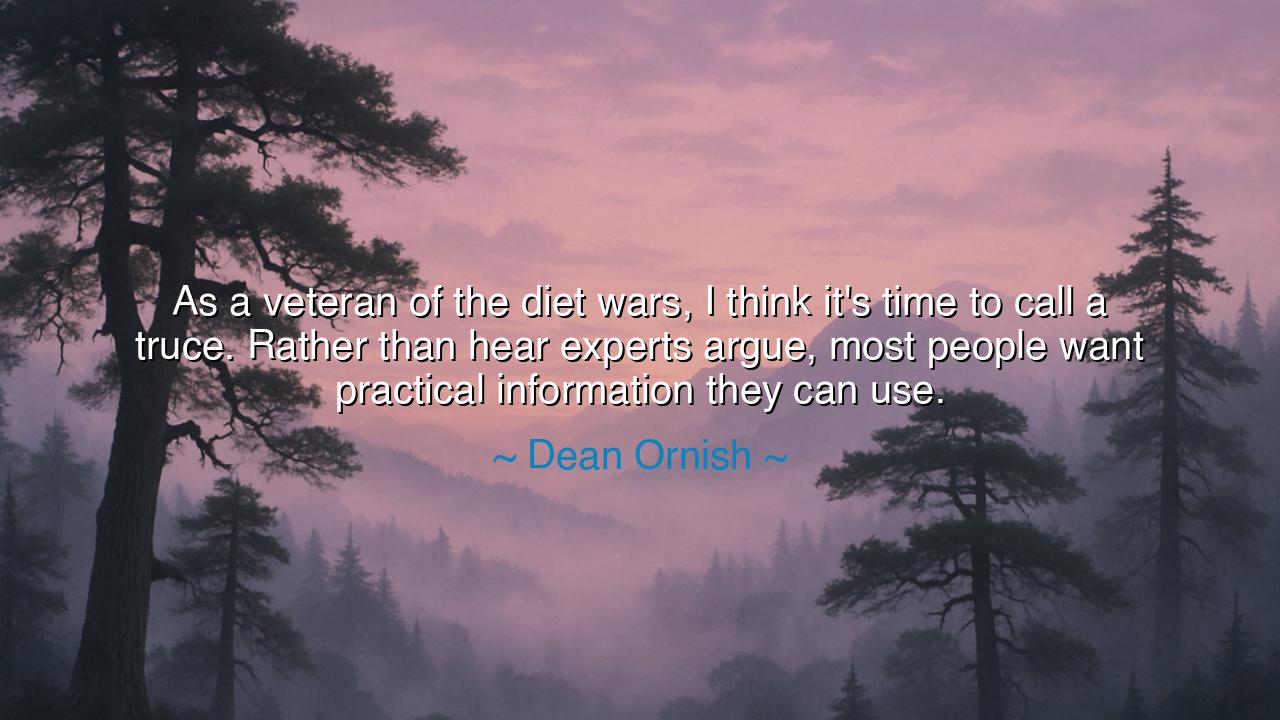
As a veteran of the diet wars, I think it's time to call a truce.
As a veteran of the diet wars, I think it's time to call a truce. Rather than hear experts argue, most people want practical information they can use.






In the wise words of Dean Ornish, the healer and reformer of modern living, there echoes a call not just for peace in the realm of nutrition, but for peace within the human heart. When he said, “As a veteran of the diet wars, I think it's time to call a truce. Rather than hear experts argue, most people want practical information they can use,” he was not merely addressing the confusion of diets or the quarrels of experts. He was reminding us that truth is not found in conflict, but in clarity; not in endless debate, but in compassionate understanding. His plea is not only scientific—it is deeply spiritual: to end the wars of division and to seek wisdom that nourishes life, not ego.
In every age, men have fought their battles of belief. Once, it was the philosophers who contended in the forums of Athens, shouting of virtue and justice while the people starved for bread and guidance. Today, the same spirit of argument lives on in the “diet wars”—one expert proclaiming the gospel of fat, another the sanctity of carbohydrates, another the supremacy of plants. But in this noise, the humble seeker, the mother preparing food for her child, the man hoping to live one more year in strength—all are left bewildered. Ornish, weary from these battles, raises the flag of truce, calling us to return to the essence of wisdom: simplicity and usefulness.
There is an ancient story from the time of the Buddha, who once encountered two monks arguing fiercely over doctrine. When they approached him for judgment, he smiled and said, “To know the path is not enough—you must walk it.” The monks fell silent, for they understood that truth is proven in action, not in words. So too with health: no diet, however perfect in theory, has value unless it can be lived—unless it brings peace to the mind and strength to the body. Ornish’s message is this: let us end the wars of opinion, and instead serve the people with wisdom that heals.
His words are also a lesson in humility. For even the most learned of experts can be ensnared by pride—defending a theory like a fortress, unwilling to yield even when truth stands at the gate. But the wise know that life is fluid, not fixed. What nourishes one may burden another; what heals today may harm tomorrow. Thus, the true sage listens not only to research but to the living body, to the rhythms of breath and the quiet voice of experience. The truce Ornish speaks of is not only between scientists—it is between knowledge and compassion, intellect and intuition.
From this, a great lesson emerges for all who live in an age of noise and division: seek not the loudest voice, but the one that brings peace. When faced with a hundred opinions, ask not “Who is right?” but “What helps me live better?” The practical wisdom Ornish calls for is like clear water—it does not boast of purity, but it quenches thirst. It is found not in the extremes of fashion, but in the balance of the everyday—in the meals prepared with care, in the walks taken at sunrise, in the moments of gratitude before eating.
Let us then, as heirs of this teaching, lay down our weapons of judgment and comparison. Let the carnivore and the vegan, the fasting monk and the feasting farmer, find common ground in respect for the body and reverence for life. For health is not a battlefield, but a garden. The soil of that garden is not made rich by argument, but by cultivation—by small, steady acts of care. Each bite of food, each breath of movement, each moment of mindfulness, is a seed of renewal.
And so, the teaching of Dean Ornish becomes not just a reflection on diet, but a parable for all human endeavor. Whether in science, faith, or daily living, the wars of words must cease if the heart is to heal. In your own life, seek peaceful wisdom—knowledge that serves, not divides. Ask yourself: “Does this bring balance? Does this help me live with love, strength, and simplicity?” And if it does, walk that path quietly, confidently. For in doing so, you will have joined the truest truce of all—the one between the mind’s confusion and the soul’s calm understanding.






AAdministratorAdministrator
Welcome, honored guests. Please leave a comment, we will respond soon